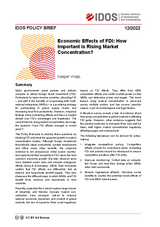Policy Brief
Economic effects of FDI: how important is rising market concentration?
Vrolijk, KasperPolicy Brief (12/2022)
Bonn: German Institute of Development and Sustainability (IDOS)
DOI: https://doi.org/10.23661/ipb12.2022
Many governments adopt policies and actively compete to attract foreign direct investment (FDI). Particularly for lower-income countries, attracting FDI – and with it the benefits of cooperating with multi-national enterprises (MNEs) – is a promising strategy for participating in global supply chains and increasing local firm productivity. However, empirical findings show contrasting effects and there is heated debate over FDI’s advantages and drawbacks. The current trend to rising market concentration also begs the question: Have FDI effects changed in recent years?
This Policy Brief aims to address these questions by studying FDI and what the apparent growth in market concentration implies. Although foreign investment theoretically raises productivity, creates employment and offers many other benefits, the empirical evidence is not unequivocal. Initial coarse country-level data found that receptivity to FDI raises the host country’s economic growth. But later research used more detailed sector data and showed ambiguous effects (Görg & Greenaway, 2004). New microdata confirm that FDI effects are differential: Not all workers and households benefit equally. They also showcase the different ways in which MNEs and FDI benefit firms, workers and households in host countries. Recently, superstar firms, which capture large shares of industries and thereby increase market con-centration, have emerged. Linked to reduced national economic dynamism and evident in global markets, the rise of superstar firms could negatively impact on FDI effects. They differ from MNE competition effects and confer market power so that MNEs can determine prices and wages. This trend toward rising market concentration is observed across multiple sectors and has several possible causes, such as technological and legal factors.
A literature survey reveals a lack of evidence about how rising concentration in global markets is affecting FDI gains. However, other evidence suggests that the positive spillovers to domestic firms may well be lower, with higher market concentration negatively affecting wages and employment. The following takeaways can be derived for policy-making:
1. Integrate competition policy: Competition effects should be considered when evaluating FDI and policies should be introduced to ensure competitive practises after FDI entry.
2. Improve monitoring: Collect data on competi-tive forces and how they change when MNEs enter host economies.
3. Absorb regressive effects: Introduce social benefits to counter the potential mixed effects of FDI and MNE market power.
Contact
Cornelia Hornschild
Publication Coordinator
E-mail Cornelia.Hornschild@idos-research.de
Phone +49 (0)228 94927-135
Fax +49 (0)228 94927-130
Alexandra Fante
Librarian/ Open Access Coordinator
E-Mail Alexandra.Fante@idos-research.de
Telefon +49 (0)228 94927-321
Fax +49 (0)228 94927-130




![[Translate to English:] Photo: Alexandra Fante, Bibliothekarin/Open Access-Koordinatorin](/fileadmin/_processed_/f/0/csm__c_Deutsches-Institut-fuer-Entwicklungspolitik_Fante_94ce4fa1ba.jpg)